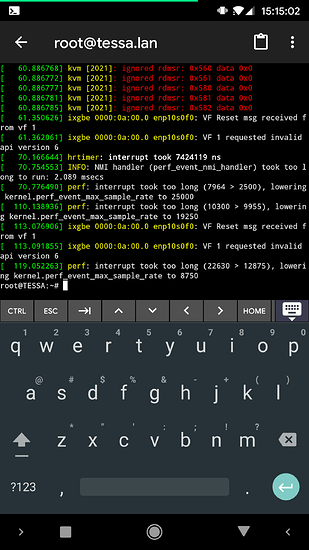In order to get vendor-reset to work on Navi10 guests, i had to update the guest’s firmware-amd-graphics package. Doing this has completley killed the graphics performance of the VM and has made the VM completley unusable.
What am i doing wrong here? Please help.
After starting the VM, the host’s dmesg looks like this:
VM XML
<domain type='kvm' id='1'>
<name>TESSA1</name>
<uuid>50ec8055-258b-47e0-a20f-7730cf37c879</uuid>
<memory unit='KiB'>33554432</memory>
<currentMemory unit='KiB'>33554432</currentMemory>
<memoryBacking>
<nosharepages/>
<locked/>
</memoryBacking>
<vcpu placement='static'>12</vcpu>
<cputune>
<vcpupin vcpu='0' cpuset='8'/>
<vcpupin vcpu='1' cpuset='24'/>
<vcpupin vcpu='2' cpuset='9'/>
<vcpupin vcpu='3' cpuset='25'/>
<vcpupin vcpu='4' cpuset='10'/>
<vcpupin vcpu='5' cpuset='26'/>
<vcpupin vcpu='6' cpuset='11'/>
<vcpupin vcpu='7' cpuset='27'/>
<vcpupin vcpu='8' cpuset='12'/>
<vcpupin vcpu='9' cpuset='28'/>
<vcpupin vcpu='10' cpuset='13'/>
<vcpupin vcpu='11' cpuset='29'/>
<emulatorsched scheduler='fifo' priority='1'/>
<vcpusched vcpus='0' scheduler='fifo' priority='1'/>
<vcpusched vcpus='1' scheduler='fifo' priority='1'/>
<vcpusched vcpus='2' scheduler='fifo' priority='1'/>
<vcpusched vcpus='3' scheduler='fifo' priority='1'/>
<vcpusched vcpus='4' scheduler='fifo' priority='1'/>
<vcpusched vcpus='5' scheduler='fifo' priority='1'/>
<vcpusched vcpus='6' scheduler='fifo' priority='1'/>
<vcpusched vcpus='7' scheduler='fifo' priority='1'/>
<vcpusched vcpus='8' scheduler='fifo' priority='1'/>
<vcpusched vcpus='9' scheduler='fifo' priority='1'/>
<vcpusched vcpus='10' scheduler='fifo' priority='1'/>
<vcpusched vcpus='11' scheduler='fifo' priority='1'/>
</cputune>
<numatune>
<memory mode='strict' nodeset='1'/>
</numatune>
<resource>
<partition>/machine</partition>
</resource>
<os>
<type arch='x86_64' machine='pc-q35-7.0'>hvm</type>
<loader readonly='no' type='rom'>/usr/share/ovmf/OVMFTESSA1.fd</loader>
</os>
<features>
<acpi/>
<apic/>
<hyperv mode='custom'>
<relaxed state='on'/>
<vapic state='on'/>
<spinlocks state='on' retries='8191'/>
<vpindex state='on'/>
<runtime state='on'/>
<synic state='on'/>
<stimer state='on'/>
<reset state='on'/>
<vendor_id state='on' value='randomid'/>
<frequencies state='on'/>
<reenlightenment state='on'/>
<tlbflush state='on'/>
<ipi state='on'/>
</hyperv>
<kvm>
<hidden state='off'/>
<hint-dedicated state='on'/>
<poll-control state='on'/>
</kvm>
<vmport state='off'/>
<ioapic driver='kvm'/>
</features>
<cpu mode='host-passthrough' check='none' migratable='off'>
<topology sockets='1' dies='1' cores='6' threads='2'/>
<cache mode='passthrough'/>
<feature policy='require' name='topoext'/>
<feature policy='require' name='svm'/>
<feature policy='require' name='apic'/>
<feature policy='require' name='hypervisor'/>
<feature policy='require' name='invtsc'/>
</cpu>
<clock offset='localtime'>
<timer name='rtc' tickpolicy='catchup'/>
<timer name='pit' tickpolicy='delay'/>
<timer name='hpet' present='yes'/>
<timer name='hypervclock' present='yes'/>
<timer name='tsc' present='yes' mode='native'/>
</clock>
<on_poweroff>destroy</on_poweroff>
<on_reboot>restart</on_reboot>
<on_crash>destroy</on_crash>
<pm>
<suspend-to-mem enabled='no'/>
<suspend-to-disk enabled='no'/>
</pm>
<devices>
<emulator>/usr/bin/qemu-system-x86_64</emulator>
<disk type='file' device='disk'>
<driver name='qemu' type='qcow2'/>
<source file='/media/primaryarray/tessa1mass.img' index='5'/>
<backingStore/>
<target dev='vda' bus='virtio'/>
<alias name='virtio-disk0'/>
<address type='pci' domain='0x0000' bus='0x00' slot='0x0b' function='0x0'/>
</disk>
<disk type='file' device='cdrom'>
<driver name='qemu' type='raw'/>
<source file='/media/primaryarray/Bleach/season2/S2D1.iso' index='4'/>
<backingStore/>
<target dev='sdb' bus='sata'/>
<readonly/>
<alias name='sata0-0-1'/>
<address type='drive' controller='0' bus='0' target='0' unit='1'/>
</disk>
<disk type='file' device='cdrom'>
<driver name='qemu' type='raw'/>
<source file='/media/primaryarray/Bleach/season2/S2D2.iso' index='3'/>
<backingStore/>
<target dev='sdc' bus='sata'/>
<readonly/>
<alias name='sata0-0-2'/>
<address type='drive' controller='0' bus='0' target='0' unit='2'/>
</disk>
<disk type='file' device='cdrom'>
<driver name='qemu' type='raw'/>
<source file='/media/primaryarray/Bleach/season2/S2D3.iso' index='2'/>
<backingStore/>
<target dev='sdd' bus='sata'/>
<readonly/>
<alias name='sata0-0-3'/>
<address type='drive' controller='0' bus='0' target='0' unit='3'/>
</disk>
<disk type='file' device='cdrom'>
<driver name='qemu' type='raw'/>
<source file='/media/primaryarray/Bleach/season2/S2D4.iso' index='1'/>
<backingStore/>
<target dev='sde' bus='sata'/>
<readonly/>
<alias name='sata0-0-4'/>
<address type='drive' controller='0' bus='0' target='0' unit='4'/>
</disk>
<controller type='pci' index='0' model='pcie-root'>
<alias name='pcie.0'/>
</controller>
<controller type='pci' index='1' model='pcie-root-port'>
<model name='pcie-root-port'/>
<target chassis='1' port='0xf'/>
<alias name='pci.1'/>
<address type='pci' domain='0x0000' bus='0x00' slot='0x01' function='0x7'/>
</controller>
<controller type='pci' index='2' model='pcie-root-port'>
<model name='pcie-root-port'/>
<target chassis='2' port='0x9'/>
<alias name='pci.2'/>
<address type='pci' domain='0x0000' bus='0x00' slot='0x01' function='0x1'/>
</controller>
<controller type='pci' index='3' model='pcie-root-port'>
<model name='pcie-root-port'/>
<target chassis='3' port='0xa'/>
<alias name='pci.3'/>
<address type='pci' domain='0x0000' bus='0x00' slot='0x01' function='0x2'/>
</controller>
<controller type='pci' index='4' model='pcie-root-port'>
<model name='pcie-root-port'/>
<target chassis='4' port='0xb'/>
<alias name='pci.4'/>
<address type='pci' domain='0x0000' bus='0x00' slot='0x01' function='0x3'/>
</controller>
<controller type='pci' index='5' model='pcie-root-port'>
<model name='pcie-root-port'/>
<target chassis='5' port='0xc'/>
<alias name='pci.5'/>
<address type='pci' domain='0x0000' bus='0x00' slot='0x01' function='0x4'/>
</controller>
<controller type='pci' index='6' model='pcie-root-port'>
<model name='pcie-root-port'/>
<target chassis='6' port='0xd'/>
<alias name='pci.6'/>
<address type='pci' domain='0x0000' bus='0x00' slot='0x01' function='0x5'/>
</controller>
<controller type='pci' index='7' model='pcie-root-port'>
<model name='pcie-root-port'/>
<target chassis='7' port='0xe'/>
<alias name='pci.7'/>
<address type='pci' domain='0x0000' bus='0x00' slot='0x01' function='0x6'/>
</controller>
<controller type='pci' index='8' model='pcie-root-port'>
<model name='pcie-root-port'/>
<target chassis='8' port='0x8'/>
<alias name='pci.8'/>
<address type='pci' domain='0x0000' bus='0x00' slot='0x01' function='0x0' multifunction='on'/>
</controller>
<controller type='pci' index='9' model='pcie-root-port'>
<model name='pcie-root-port'/>
<target chassis='9' port='0x18'/>
<alias name='pci.9'/>
<address type='pci' domain='0x0000' bus='0x00' slot='0x03' function='0x0'/>
</controller>
<controller type='pci' index='10' model='pcie-to-pci-bridge'>
<model name='pcie-pci-bridge'/>
<alias name='pci.10'/>
<address type='pci' domain='0x0000' bus='0x03' slot='0x00' function='0x0'/>
</controller>
<controller type='virtio-serial' index='0'>
<alias name='virtio-serial0'/>
<address type='pci' domain='0x0000' bus='0x00' slot='0x06' function='0x0'/>
</controller>
<controller type='usb' index='0' model='qemu-xhci' ports='15'>
<alias name='usb'/>
<address type='pci' domain='0x0000' bus='0x00' slot='0x05' function='0x0'/>
</controller>
<controller type='sata' index='0'>
<alias name='ide'/>
<address type='pci' domain='0x0000' bus='0x00' slot='0x1f' function='0x2'/>
</controller>
<serial type='pty'>
<source path='/dev/pts/0'/>
<target type='isa-serial' port='0'>
<model name='isa-serial'/>
</target>
<alias name='serial0'/>
</serial>
<console type='pty' tty='/dev/pts/0'>
<source path='/dev/pts/0'/>
<target type='serial' port='0'/>
<alias name='serial0'/>
</console>
<input type='mouse' bus='ps2'>
<alias name='input0'/>
</input>
<input type='keyboard' bus='ps2'>
<alias name='input1'/>
</input>
<audio id='1' type='none'/>
<hostdev mode='subsystem' type='pci' managed='yes'>
<driver name='vfio'/>
<source>
<address domain='0x0000' bus='0x0a' slot='0x10' function='0x2'/>
</source>
<alias name='hostdev0'/>
<address type='pci' domain='0x0000' bus='0x00' slot='0x08' function='0x0'/>
</hostdev>
<hostdev mode='subsystem' type='pci' managed='yes'>
<driver name='vfio'/>
<source>
<address domain='0x0000' bus='0x09' slot='0x00' function='0x0'/>
</source>
<boot order='1'/>
<alias name='hostdev1'/>
<address type='pci' domain='0x0000' bus='0x02' slot='0x00' function='0x0'/>
</hostdev>
<hostdev mode='subsystem' type='pci' managed='yes'>
<driver name='vfio'/>
<source>
<address domain='0x0000' bus='0x48' slot='0x00' function='0x0'/>
</source>
<alias name='hostdev2'/>
<address type='pci' domain='0x0000' bus='0x00' slot='0x02' function='0x0' multifunction='on'/>
</hostdev>
<hostdev mode='subsystem' type='pci' managed='yes'>
<driver name='vfio'/>
<source>
<address domain='0x0000' bus='0x48' slot='0x00' function='0x1'/>
</source>
<alias name='hostdev3'/>
<address type='pci' domain='0x0000' bus='0x00' slot='0x02' function='0x1'/>
</hostdev>
<hostdev mode='subsystem' type='pci' managed='yes'>
<driver name='vfio'/>
<source>
<address domain='0x0000' bus='0x49' slot='0x00' function='0x3'/>
</source>
<alias name='hostdev4'/>
<address type='pci' domain='0x0000' bus='0x01' slot='0x00' function='0x0'/>
</hostdev>
<memballoon model='none'/>
<shmem name='looking-glass'>
<model type='ivshmem-plain'/>
<size unit='M'>32</size>
<alias name='shmem0'/>
<address type='pci' domain='0x0000' bus='0x00' slot='0x04' function='0x0'/>
</shmem>
</devices>
<seclabel type='dynamic' model='dac' relabel='yes'>
<label>+0:+64055</label>
<imagelabel>+0:+64055</imagelabel>
</seclabel>
</domain>
UPDATE: after many cycles of virsh shutdown and virsh start, the VM regains its full performance and is usable. still, this is very annoying and i’d rather not have to do this.
UPDATE: when performing poorly, the guest’s dmesg gives “hrtimer: interrupt took 12082868 ns” i am at such a loss as to what the problem could be here. this does not happen once the guest returns to normal performance.
